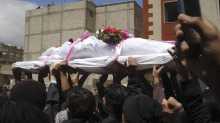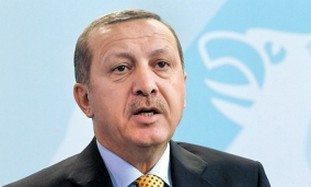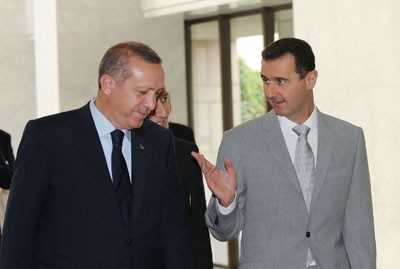DAMASCUS // Turkish prime minister Recep Tayyip Erdogan has said he will urge his close ally, Syrian president Bashar al Assad, to drop repressive emergency laws and release thousands of political prisoners in the face of growing public demands for greater freedom.
 Mr Erdogan, much like the Syrian public, appears to have expected these measures would be introduced by Mr al Assad in his speech last Wednesday, the Syrian leader’s first public response to anti-government demonstrations.
Mr Erdogan, much like the Syrian public, appears to have expected these measures would be introduced by Mr al Assad in his speech last Wednesday, the Syrian leader’s first public response to anti-government demonstrations.
Instead of unveiling significant reforms, Mr al Assad said protests were part of a foreign “conspiracy” that he would fight against, not meet with political concessions.
“Beyond governmental change, there were expectations on removal of emergency rule, release of political prisoners and a new constitution,” Mr Erdogan said on Friday during an official visit to London. He promised to “say this to Mr Assad” tomorrow if these steps were not implemented.
The day after making his speech, Mr al Assad issued three decrees that could pave the way for limited reforms, including tasking a committee to examine shifting martial law, which has been in place since 1963. The draconian legislation is widely used against political dissidents.
But, crucially, no commitment was made on freeing political prisoners or changing the constitution to give the Syrian people more basic civil liberties. There are also widespread concerns in Damascus that the government might replace the emergency laws with antiterrorism laws that are no less restrictive.
Protesters, who have been calling for sweeping changes to Syria’s autocratic system of government, say the steps do not go far enough.
While the United States and European Union have repeatedly condemned Syria’s failure to carry out reforms, and its harsh suppression of public demonstrations, they have limited – if any – leverage over Damascus, which is accustomed to finding itself at loggerheads with Washington and Brussels over foreign policies and human rights.
As one of Syria’s key allies, with a close political relationship and extensive economic ties, Ankara is much better placed to influence Syrian decision making, even though Damascus jealously guards its sovereignty over domestic policy.
Mr Erdogan is considered to be one of the world leaders closest to Mr al Assad, an affinity that has led to a quick strengthening of their countries’ links. Turkey has supported Syrian foreign policies, including its combative stance towards Israel, something for which Damascus is chastised by the US and, to a lesser degree, the EU.
According to the Turkish prime minister’s office, he has spoken twice to Mr al Assad by telephone since demonstrations broke out last month. Other regional leaders have made similar calls – but have used them to support Syria, rather than advising it to push through political reforms. That has helped to bolster Mr al Assad’s position and hardline stance, Syrian analysts say.
The UN general secretary, Ban Ki-Moon, yesterday added his voice to those condemning Syria’s methods in putting down protests, including the use of live ammunition that has resulted in dozens of deaths.
Human rights activists in Damascus estimate that more than 100 people have been killed nationwide by security forces since March 18, a number the Syrian authorities dispute, saying the figure is about 30. They blame “armed gangs” for many of the slayings.
In a statement released yesterday, Mr Ban’s office said he was “deeply concerned” about the situation in Syria, insisting it could only be solved by comprehensive political reforms that “address the legitimate aspirations of the Syrian people”.
“He deplores the use of violence against peaceful demonstrators and calls for it to cease immediately,” the statement said.
The most recent killings took place on Friday, in the northern Damascus suburb of Douma, with at least three people killed, according to the authorities. A civil rights activist told The National that four people had died, while one report, by the AFP news agency, quoted a witness as saying eight had been fatally shot.
Protesters have blamed armed police for the deaths but Syrian officials say security units came under fire and shot back to defend themselves. Pictures of injured police officers were published by the state media yesterday to support the claim.
That some other demonstrations on Friday passed without violence perhaps adds credibility to the government’s accounts. So, too, do independent reports that gunmen shot at police in what was apparently a successful attempt to provoke a violent response against the majority of unarmed civilians in order to escalate the crisis. Syrian state media also reported that a girl in Homs was killed on Friday when gunmen opened fire during a protest. None of these accounts can be verified. It has similarly been impossible to independently check the number of civilian casualties. The government has launched its own investigation, with a panel of judges beginning its work in Deraa at the weekend.
Human rights campaigners in Damascus warned that a government campaign against activists had intensified after Friday’s demonstrations, with dawn arrests in the region around Deraa, 100 kilometres south of the capital and the epicentre of anti-government dissidence.
“There were more arrests on Saturday morning across the country,” said a civil rights campaigner. “So many people have been arrested since the demonstrations began that we have not been able to keep track of them all, we’re talking about hundreds of people, all held without charge in security branches.”
One leading dissident, Suhair Attasi, was moved from Duma to Adra prison yesterday, according to activists, a step they said appears to signify she will be put on trial.
Ms Attasi was arrested on March 16 at a peaceful demonstration outside the ministry of interior in Damascus, calling for the release of political prisoners. It was the first major public demonstration in Syria for years. Two days later, thousands of protesters in Deraa confronted security forces, starting what would become the most serious challenge to Syria’s ruling elite in decades.
[email protected]




 In this citizen journalism image made on a mobile phone and acquired Saturday April 23, 2011, by The Associated Press, Syrian anti-government protesters carry the coffin of an activist who was killed on Friday during his funeral procession in Quaboun near Damascus, Syria, Saturday, April 23, 2011. Syrian security forces fired on tens of thousands of mourners during funeral processions Saturday, killing several people following the deadliest day of the uprising against authoritarian President Bashar Assad. (AP Photo)
In this citizen journalism image made on a mobile phone and acquired Saturday April 23, 2011, by The Associated Press, Syrian anti-government protesters carry the coffin of an activist who was killed on Friday during his funeral procession in Quaboun near Damascus, Syria, Saturday, April 23, 2011. Syrian security forces fired on tens of thousands of mourners during funeral processions Saturday, killing several people following the deadliest day of the uprising against authoritarian President Bashar Assad. (AP Photo) Mr Erdogan, much like the Syrian public, appears to have expected these measures would be introduced by Mr al Assad in his speech last Wednesday, the Syrian leader’s first public response to anti-government demonstrations.
Mr Erdogan, much like the Syrian public, appears to have expected these measures would be introduced by Mr al Assad in his speech last Wednesday, the Syrian leader’s first public response to anti-government demonstrations. “Beyond governmental change, there were expectations on removal of emergency rule, release of political prisoners and a new constitution,” Erdogan told journalists who accompanied him on Friday on his way back from an official visit to London.
“Beyond governmental change, there were expectations on removal of emergency rule, release of political prisoners and a new constitution,” Erdogan told journalists who accompanied him on Friday on his way back from an official visit to London.